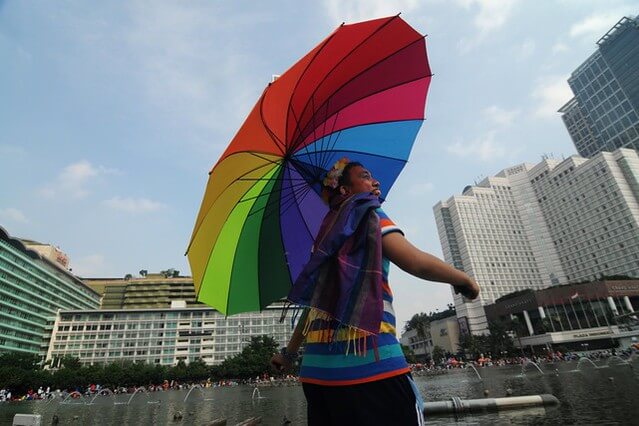In
February 2020, three lawmakers belonging to the Indonesian House of Representatives introduced the
“Family Resilience Bill”. Within this legislation, it is written that people belonging to the LGBTQ+ community are a threat to the nuclear family, and to be homosexual is the same as engaging in incest and sadomasochism. The bill therefore punishes people belonging to the
LGBTQ+ community, obliging them to go through rehabilitation at a number of fundamentally religious treatment centres that legislators want to open across the conservative Indonesian islands. If these terms are not willingly agreed upon, the family of community members will be forced to report them.
Sodik Mujahid, a member of the Gerindra party and a supporter of the legislation, shares that though a person’s sexuality is something that is seen as a private matter in many countries, in the case of Indonesia this is seen as a matter that concerns everyone. Mujahid means that the fact of someone’s homosexuality can affect the future of humankind, and therefore it is an issue that belongs in the public sphere.
Opponents of the bill are not staying silent: the bill has received criticism both from LGBTQ+ sympathizers and other members of parliament. In particular, the bill’s opponents argue that a person’s sexuality is a
private matter, and is nothing for the government to interfere in. To implement a legislation of this kind would have a
serious impact on sexual and gender minorities in the country, and the oppression and hate that the LGBTQ community already faces on a daily basis would only grow worse and they would find themselves in an even more vulnerable and isolated position.
Dede Oetomo, co-founder of the the Indonesian LGBTQ+ advocacy and rights group Gaya Nusantara Foundation, thinks that this bill is simply about conservative lawmakers trying to target the LGBTQ+ community once again, since they failed at their attempt to
criminalise homosexuality in 2018. The 2018 parliamentary legislation wanted to ban all pre-marital sex, and since same-sex marriage is banned in the majority of Indonesia, that would have directly included all sexual activity between people of the same gender.
Historically, Indonesia tolerated gay people, but for the past few years members of the government have continuously tried to push for anti-LGBTQ bills to be implemented. Oetomo believes that the government is attempting to
“create a moral panic”. Indonesia has no official criminal codes that ban homosexuality, except for a few provinces that follow local Shariah law and have their own punishments. Hence, since there does not exist any anti-sodomy law, or any other way to punish people for their sexuality, the government are now trying to use this family resilience bill as an excuse to justifiably discriminate against the LGBTQ+ community.
Oetomo brings up that even if the bill is not officially implemented in the end a lot of damage has already been done. People belonging to the LGBTQ+ community fear that one of these laws will eventually be implemented, and some people are already trying to find other means to survive, such as
seeking asylum or moving to another country.
Furthermore, a law condemning homosexuality might not have been made on a national level, but some local authorities are looking at establishing their own homosexuality rehabilitation programs. In 2019 the mayor of Padang,
Mahyedi Ansarullah, supervised a number of exorcisms that were forcibly performed on a group of 10 women that had been arrested on homosexuality charges. Additionally, there are more than
20 additional proposed regulations across the country that strive towards criminalising homosexuality.
However, some LGBTQ+ communities in Indonesia are still standing tall and are offering support and help to vulnerable people during these tough times of the pandemic. Despite the backlash and opposition they receive from many in their surroundings, they are showing love and compassion towards those that really need it. LGBTQ+ communities in
Maumere, Yogyakarta, and Surabaya have provided people in need with necessities such as food and cash, despite their own misfortunes in life. Organisations led by transgender women, known as
waria, who are a marginalised and overlooked group, have also provided help to both their own community and others. Furthermore, members of an Islamic boarding school for transgender women in Yogyakarta have organised a weekly food truck for those in need.
Despite their own uncertain futures, LGBTQ+ communities in Indonesia are not letting themselves be beaten down. When it comes to the proposal of the
legislation that wants to criminalise them for being who they are, they are voicing their criticisms and are working with LGBTQ+ human rights groups and advocates to prevent it from being implemented. In the matter of general life and getting through this pandemic,
LGBTQ+ communities are not feeding hate with hate. Rather, they are doing their part to help the people who need it.
In November 2020, information provided by
Jakarta Globe, and
Asia Pacific Solidarity Network, let us know that deliberations regarding the bill came to an end, and
The House of Representatives (DPR) legislation board (Baleg) decided to reject the controversial draft family resilience bill.
Suprataman Andi Agtas, Chairman of the DPR’s Legislation Body, stated that “five parties, which combined control two-thirds of the seats in the chamber, rejected the so-called family resilience bill”, and this is the reason why they dropped it. In order to put a bill in the
National Legislation Program, the Legislation Body needs an unanimous or the majority votes from the factions, but in this case the majority voted against it. The Golkar party was a party that first supported the implementation of the bill, but then went on to reject it.
Nurul Arifin, lawmaker of the Golkar party, said that “Several draft changes made the bill not urgent to support. One change in the bill gave power to the government to record any family conflicts and problems”.

